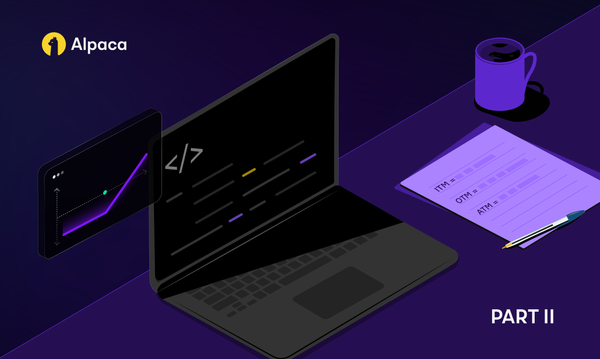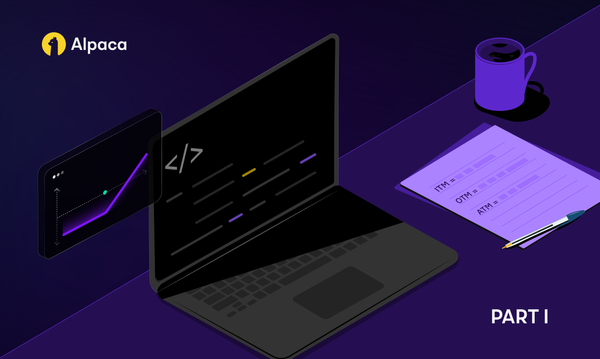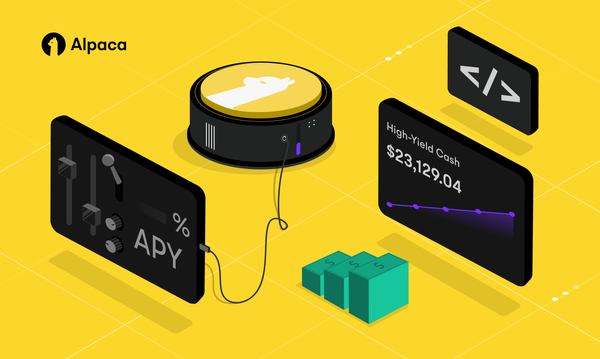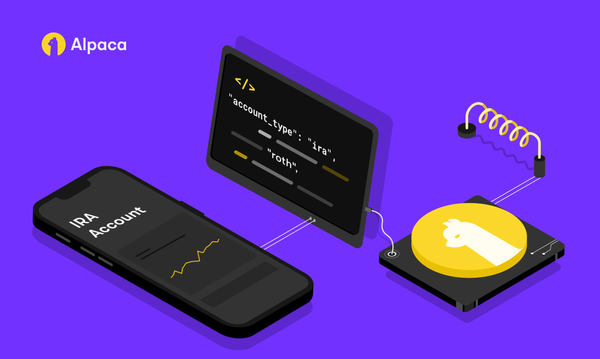Fintech Underground Ep. 25 - The Quest to Make Everyone an Algo Trader ft. Breaking Equity
Listen as we chat with Devin Crane, CEO and co-founder of Breaking Equity, about systematic trading, how to capture inefficiencies and efficiencies in the market, and the relationship between crypto and securities.
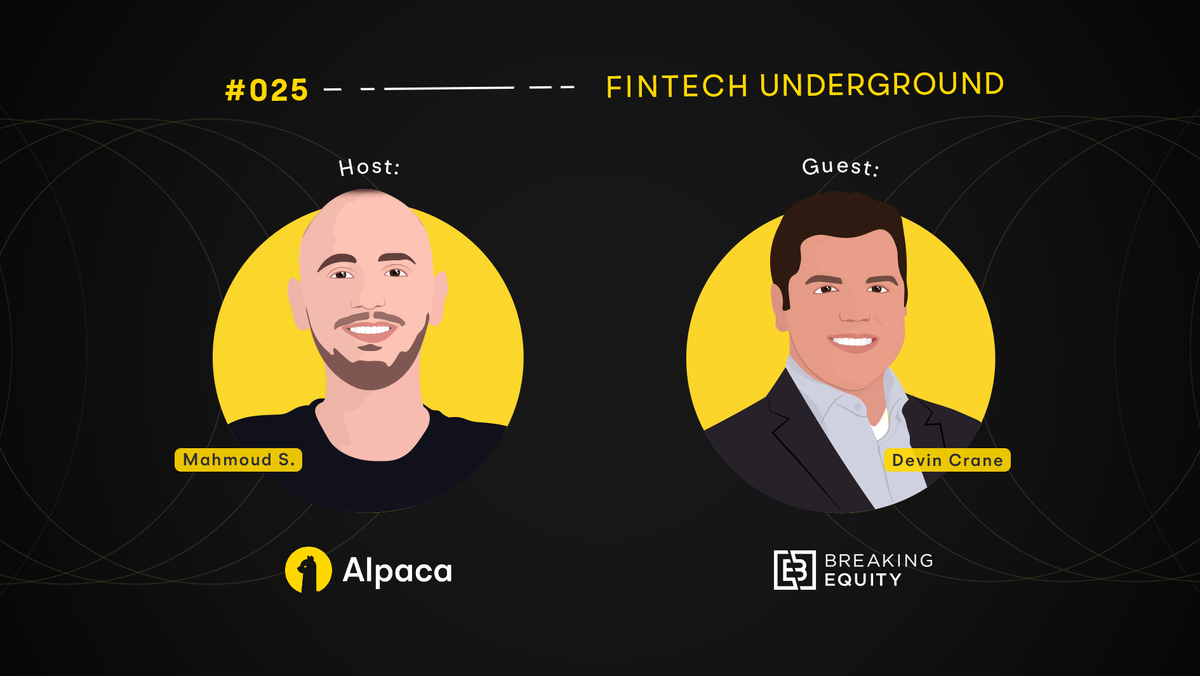
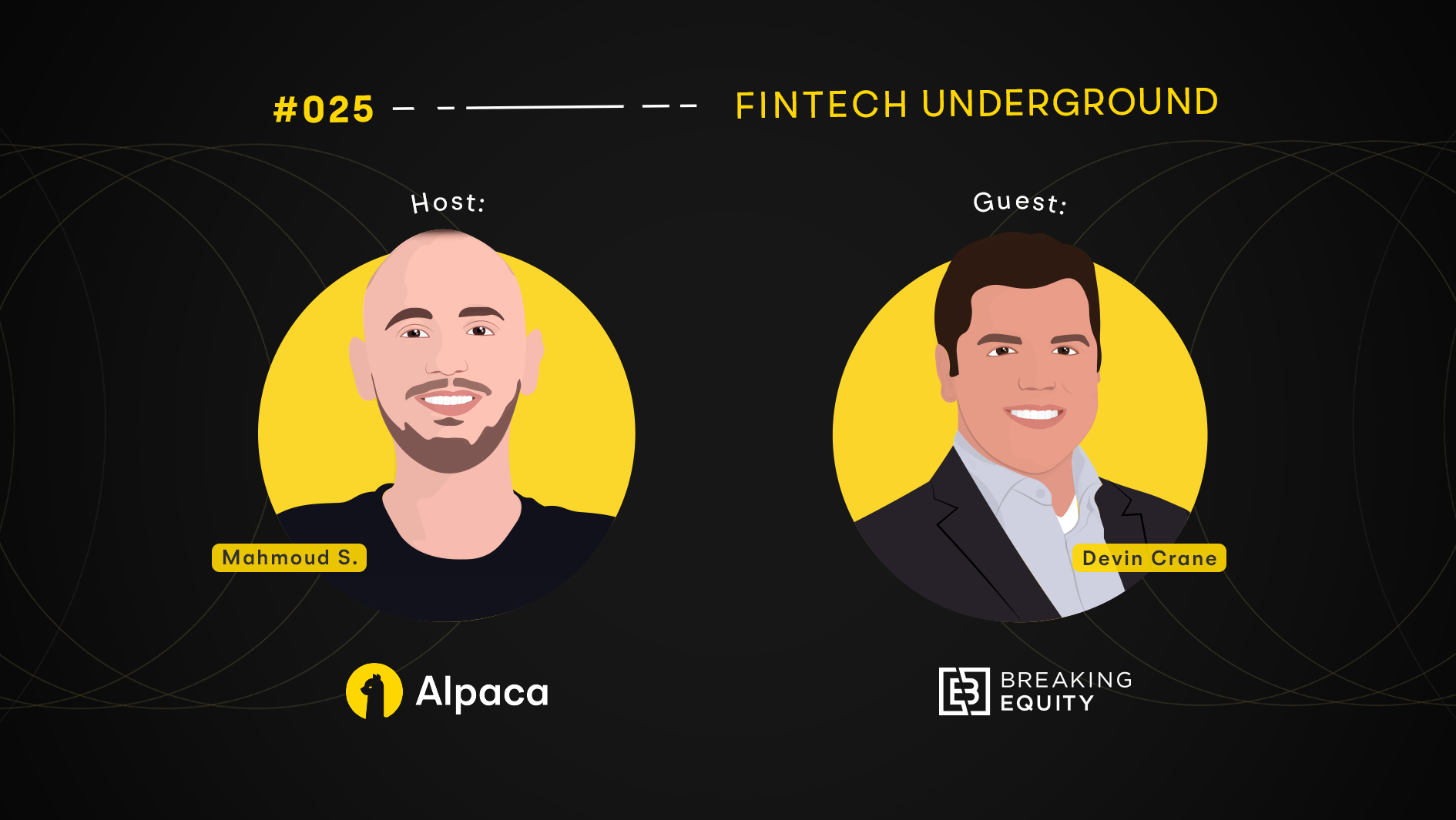
All views and opinions expressed by the guest speakers are solely their views and opinions and do not reflect or represent the views and opinions of Alpaca Securities LLC, Alpaca Crypto LLC, and AlpacaDB. The guest speakers' opinions are based on information they consider reliable and therefore Alpaca Securities LLC, Alpaca Crypto LLC, and AlpacaDB do not warrant its completeness, accuracy and it should not be relied upon as such.
The content is for general informational purposes only. Alpaca Securities LLC and Alpaca Crypto LLC do not recommend any specific investments, investment strategies or cryptocurrencies.
Fintech Underground by Alpaca is a podcast devoted to all topics related to stock trading and APIs. From trading with algorithms or connecting apps or building out services, we aim to bring light to the different corners of Fintech.

TL;DR
In episode 25 of Fintech Underground by Alpaca, we interviewed Devin Crane, CEO and Co-founder of Breaking Equity. Tune in as we talk about the role of systematic trading, how to capture inefficiencies and efficiencies in the market, and the relationship between crypto and securities.

Find the full transcript below. To hear more of the most interesting Fintech companies speak about their experience in the industry, check out our other episodes below.
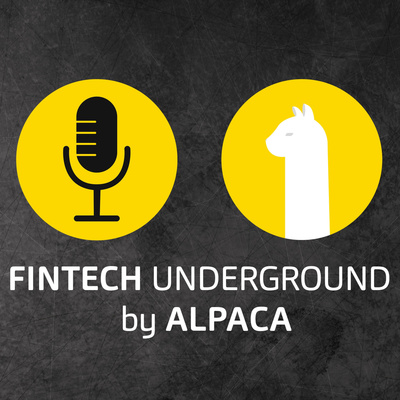
Full Transcript
Alpaca is a developer-first startup focused on building open APIs for stock and crypto trading, investing, and embedding. You can learn more by visiting our website at alpaca.markets. You can also find us on Twitter @AlpacaWeb3 or join our discord community also with the invite link @AlpacaWeb3.
Mahmoud: Hi, Devin.
Devin: Hey, Mahmoud how are you?
Mahmoud: I'm good. I'm good. How about you?
Devin: You know, never better.
Mahmoud: Thank you so much for joining this podcast, Fintech Underground. We're starting up a new series highlighting our top builders on top of Connect API. And, you know, we're talking about builders that are building new and innovative apps on top of our APIs. So, welcome!
Devin: Yeah. Thanks so much for having me super excited to be here and really like, everything, you're doing at alpaca.
Mahmoud: So let's start at the beginning. How did you come up with Breaking Equity? What's your background as a founder?
Devin: Yeah, that's a great question, mostly because I don't have a typical finance capital markets background. I've been working in AI machine learning automation for the past 10 years or so. And a number of years ago, when Robinhood first came out, Robinhood was sort of this advent of democratization of finance and getting people into the markets.
And I got really really deep into trading. And, you know, you join these chat rooms and you start reading as much as you can and you start, understanding how to trade. What I kind of realized is as I'm observing people trade, and as I'm studying these things, people are just implementing systems based on data, and repeating those systems over and over again.
And one of the really interesting things is these principles by Ray Dalio, from Bridgewater, who just basically said he tried to automate and build a system around all the trades that he made. So finally, I was saying, why don't I automate my trades and got into algorithmic trading.
But what I realized in terms of algorithmic trading is that it's really, really hard. And there's so many components required to this, that building something meaningful quickly is just not really feasible, and so as I'm going through this process, my co-founder and I, Michael, we're kind of talking around one another. We're talking about our trades, we're talking about how we're trading and what we're trading, and we're circling this idea around automation for algorithmic trading. How do we build an automated system that can identify what the best opportunities to trade are? We built our MVP for ourselves and it worked. And that was like really cool because when you build something and it starts working, it was like, oh my goodness, this is what we've always wanted. You know, to start identifying these opportunities because we couldn't find really a product on the market that fit our need. There's a lot of systems out there but we were looking for something slightly more extensible from the ability to identify trades and make opportunities on these trades.
So we just started building it ourselves and then we were like, hey man, maybe we could turn this into into a company and see if people wanted it and we got a crazy good response in terms of what we were building and people were coming up to us and saying, "Hey, you guys are doing something that we've been looking for for a long time."
So that's how we started. That's why we got into this, because we really think that this is the next evolution of how people will trade going from, you know, just buying. You know, options or equities or futures manually, you know, you can employ a specific strategy and automate it.
Mahmoud: Yeah, we're starting to see a lot of individuals, a lot of companies going more into algo trading and going more into systematic trading. The first question that comes to mind is what is that big differentiator?
Devin: Yeah, great question. The way that I kind of think about this is we enable people to start running systematic strategies in a matter of minutes, like automated strategies in a matter of minutes, compared to standing up your own infrastructure, developing your own strategy.
We give you templates for that. We're able to provide you the metrics behind it. So you don't need to develop your own analytics dashboards and things like that. Um, and then it's, it's a one click broker integration, like two alpaca where, where frankly, you guys have probably the best order management system we've, we've interfaced with.
In fact, I'm using it for my own trades. And so as we're doing this, we're really making automated trading accessible to retail traders. One of the other unique things is we're actually building a automated ETF marketplace where you can basically subscribe to strategies for things like Jim Kramer's inverse, you know, mad money. We could do Reddit sentiment. We could even follow Congressional trades, like Nancy Pelosi, who, you know, is kind of a lightning route these days in terms of her trades. But this is what we're doing because right now everything is manual.
Unless you know how to do all of these things, everything is just behind you choosing what to do, and then you're not given really a lot of feedback in terms of what's a good signal to enter. What's a good signal to exit. So this is where we think we can differentiate ourselves.
And one more thing, just to kind of extrapolate on that, is it's not necessarily automated rebalancing, but it's actively employing your money to work for you in a much more active sense.
Mahmoud: Okay. How does the process look? What kind of discovery do you guys do? Um, sort of the research. Are you guys backtesting these strategies? How are you backtesting? Walk me through a journey of developing a strategy with Breaking Equity.
Devin: Yeah. Great question. We have all these strategies on the dashboard that people are employing and one of the ways that we create strategies is, Michael and I will just start talking about what we can do.
Like what kind of strategies are garnering interest. And so you're able to use one of the examples that we provide, or you're able to develop your own with any type of technical analysis indicator. And then you were able to build a screen. So you may be familiar with screens in terms of like similar stocks or running market sector rotations or things like that. But a screen is basically how to identify the highest probability of trades against a specific stock set. And then you're able to backtest it and we have institutional grade data. That you're able to run on minute on minute by minute basis. We've actually gotten really good reviews on our back testing engine from, from hedge funds, uh, that have taken a look at our platform.
Uh, then, you know, you're able to test it out in a simulated environment. So you're able to paper trade, and this is really important because everything that you you know, may not translate to, to live trading because you're kind of working in a sterile environment. But when you actually algo trade, you need the ability to actually test how it's gonna perform in the market.
That's where you're able to identify, does it match with the back testing results that you have? Then you're able to click in a matter of like two clicks, you're able to run your strategy live. We really try and make it a matter of running an automated strategy in as little as four clicks.
Mahmoud: Let's say that I'm a developer, right? I just signed up to Alpaca. How do I sort of come up with my own algo, right? You've been able to bridge that gap between being a developer or being into AI and then moving on to trading. How can we allow other traders to also bridge that gap?
Devin: Yeah. One of the challenges that we are that sort of faced with in terms of automated trading is people are highly dependent on understanding the entire ecosystem of automated trading. And one of the values that we add is employing strategies quickly, right?
Every strategy has a half life. So you need to constantly refine how you're trading. And this is where we can specifically add that value. We have this marketplace where people are able to pick up different types of strategies that they want to run.
Running that on my own setup, would've taken me, because you know, as not an expert programmer, a full stack developer, would've taken me at least a couple months, and now you're able to test that in a matter of minutes and everyone is able to do it, and we really want to help people to do that too.
Mahmoud: Let's talk a little bit about the advantages and disadvantages of automated trading, right? Especially in today's market. It's a bear market, high volatility. Where does automated trading fit into it?
Devin: Oh my gosh. I love this question because most people think of investing as only going long, right?
And by going long, you think the stock's going to go up or the option, you know, has, has value up, but the benefit of algo trading and automated trading is that you can go both long and short and all of the emotions are removed and you're doing this strictly on a database, right? The other aspect, as you kind of mentioned with the current market volatility, like, are we in a bear market or, you know, on the last couple weeks we seem to have turned around and, you know, broke out to the upside a little bit.
Is that volatility introduces this, arbitrage isn't the right word, but it's a time arbitrage, meaning deploying an automated strategy allows you and enables you to take advantage of these short term opportunities. But it's not really accessible to retail traders. And now it is accessible because you're able to execute instantly computers are able to execute without having to think about it. It's just based on data inputs.
And this is like such a competitive advantage to people trading and understanding what they're trying to do, like understanding how, how to make money trading and you've seen retail traders, like the GME saga, the AMC saga, you see retail investors investing more and more and more and looking for these efficiencies that they can gain these edges that they can gain in the market. You know, time arbitrage is one of the things that I really try to use in the strategies that I'm running.
Your order management system executes based on the studies that I run thousands of times faster than other brokers and, you know, kudos to you guys. And what Breaking Equity does is it serves is that layer that enables people to leverage your infrastructure.
Mahmoud: So do you think that crypto's here to stay or is this sort of like, uh, way you. What about shitcoins?
Devin: Oh man.
Mahmoud: These all important question for traders by the way right? Like, I mean,
Devin: No, they're such good questions. These are are awesome. I think crypto is an advent of really democratizing how people are able to trade.
We've seen crypto's here to stay. Everyone has their own opinion. We're in the middle of crypto winter, from what they're saying, but crypto has unlocked the ability to (A) trade 24/7 (B) introduces correlations to international markets significantly, compared to like typical institutions and it's like you have the free exchange of money and you're able to trade, like one of my favorite things that I do as I'm trading is looking at the price of Bitcoin and Ethereum prior to market open, because there's some sort of correlation, whether it's up premarket, whether it's up huge premarket, whether it's down, it gives you some sort of indication towards what's happening with the market.
And because crypto's trading 24 7, you're seeing the exchanges, uh, like CBOE is opening. You know, SPY options trading for Tuesdays and Thursdays before it was, you know, Monday, Wednesday, Friday. So crypto is definitely pushing the advancement of financial democratization and where it's going.
Mahmoud: So a couple of questions here. One is when will Breaking Equity get into crypto? And two, who do you think is leading the market here now? Is it equities leading crypto or is it crypto leading equities? Are we seeing that affecting the equities market?
Devin: Really good question. Let me take the first one. When are we planning on getting into crypto? We're looking into it every single day. We actually are thinking about releasing some specific strategies for crypto, and you could do like parallels to equities markets as, as part of the crypto. Uh, offering. So we're looking, we're looking into it. Trust me if I had a specific date Mahmoud I would, I would tell you like instantly, um, but it's definitely on our roadmap and we think that there's some really interesting ways that we can run the code. So you can stake against specific strategies too.
Meaning we can, we can stake coins against strategies for inherent value and strategy performance. So that's kind of one of the ways that we're looking into this. The second is the second question you asked, how are the markets related and which one's leading, which like, if you follow the trail of money with where things are going, crypto's this new infrastructure and people are infatuated with this new infrastructure of crypto. So I think that that crypto is definitely leading the way, but I think more people are still familiar and more comfortable with the old infrastructure of like equities and options.
Mahmoud: There is a lot to unpack here, but
Devin: There's, there's so much related to related to this in terms of how infrastructures work together and you. Crypto integrations, things like that.
Mahmoud: All right. I'm gonna ask a couple of quick questions.
Devin: Yeah, yeah, yeah.
Mahmoud: So number one is what is the top book that you recommend to traders today?
Devin: There's a couple. There's a book... I forget the author, but it's about Warren Buffet's story about how he started out and his obsession with finding things of value. I think that's really important in terms of just finding what's valuable and making trades against that and understanding that even when you have opportunities, you need to take a long term look at this.
And I think this is where, at least in my mind, automated trading came into play. Because an automated strategy may not work in the short term, but it could be really, really good long term. The other one was Ray Dalio's principles, which really started me down this path of automated trading. And how do you develop principles for trades and follow those rules?
Ray Dalio is definitely on top of many lists this, I think. And it's always interesting to see how he thinks about this stuff and how he always comes back. And almost like, I wouldn't say revisit, but, he almost reanalyzes previous situations and he's been around.
Yeah. He's starting Bridgewaters they've done. Okay. You could. They they've done. All right. But it's, it's like he, he trades like a machine, so
Mahmoud: We've come back full circle, what's your favorite Twitter account. And it could be FinTech, it could be crypto, it could be Web3. Could be anything, honestly, but what's your favorite Twitter account?
Devin: What's my favorite Twitter account?
Mahmoud: The one person you wouldn't unfollow.
Devin: The one person I wouldn't unfollow, man. I wouldn't unfollow breaking equity, but that's probably biased. Give me, gimme, gimme a second to think of that one.
There's some that I think are just hilarious, Elon Musk, I think is hilarious. And then Paul Graham, the founder of Y Combinator, always has really insightful things to say. So probably those guys.
Mahmoud: Okay. What is the one advice you'd give to algo traders today? We're sort of looking at people that want to take this up as a serious hobby. They want to get into systematic trading and automated strategies. They want to get into finding inefficiencies. What is the one advice you'd give to someone just starting to get into this industry?
Devin: Yeah, good question. Don't don't give up! Sooner rather than later, there's always going to be these opportunities to take advantage of these systematically in the market.
Find tools that help, that help you find a community that really helps you too. So one of my favorite parts about Breaking Equities is we've found really helpful people to give us helpful feedback as we're developing the platform and we're bouncing ideas off one another, all the time.
Find a community to help you. You can go far alone, but you go farther together. And so that's where that's where like the community from Alpaca is too is, is super helpful. I would love to do more with you guys in that respect because algo trading is a smaller, tighter community than I think where it will be in the next three to five years. I think it's just gonna become a real way for people to trade.
Mahmoud: I think I'm done here. Do you have any last thoughts? Thank you so much, Devin and it's always a pleasure. You've helped us a lot along the way of figuring out our product strategy for Connect and we have a lot more features coming for you.
Devin: I can't wait. Our users can't wait too. We're in this together. We're forging the way for the democratization of trading.
Mahmoud: Thank you so much, Devin.
Devin: Awesome. Talk to you soon.
The content and comments of this podcast should not be taken as a pack, providing investment legal and or tax advice. Every situation is different and you are encouraged to seek independent, legal and investment and or tax advice. Cryptocurrency is highly speculative in nature involves a high degree of risks, such as volatile market price swings, market manipulation, flash crashes, and cybersecurity risks.
Cryptocurrency is not regulated or is slightly regulated. In most countries. Cryptocurrency trading can lead to large, immediate and permanent loss of financial value. You should have appropriate knowledge and experience before engaging in cryptocurrency trading.
There is no guarantee that any investment strategy will achieve its objectives. All investments involve risk and the past performance of a security, or financial product does not guarantee future results or returns. Keep in mind that while diversification may help spread risk it does not assure a profit, or protect against loss. There is always the potential of losing money when you invest in securities, or other financial products. Investors should consider their investment objectives and risks carefully before investing.




